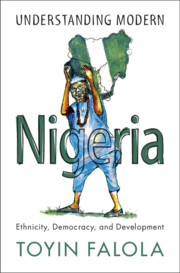Crossref Citations
This Book has been
cited by the following publications. This list is generated based on data provided by Crossref.
Potgieter, Thean
2022.
Notes on Selected New Books for Readers and Students on African Affairs.
Africa Journal of Public Sector Development and Governance,
Vol. 5,
Issue. 1,
p.
244.
Ikhane, Peter Aloysius
2023.
Global Health, Humanity and the COVID-19 Pandemic.
p.
75.
Virk, Amrit
Nelson, Ediomo-Ubong
and
Dele-Adedeji, Ini
2023.
The challenge of youth unemployment in Nigeria.
Journal of International and Comparative Social Policy,
Vol. 39,
Issue. 3,
p.
319.
2024.
Understanding Colonial Nigeria.
p.
573.
Onyejegbu, Maureen Nwando
2024.
African Objects Matter: Towards Salvaging, Collecting and Preserving More Cultural/ Historical Objects in South-East Nigeria, Africa.
Journal of Heritage Management,
Babalola, Dele
and
Okafor, Chukwuemeka
2024.
The Challenges of Nation-Building in Nigeria and the State-Building Alternative.
Ethnopolitics,
Vol. 23,
Issue. 1,
p.
20.
Miller, Jared
2024.
The price of politics: What the 2020 oil shocks in Nigeria teach us about transactional political systems.
Environment and Security,
Vol. 2,
Issue. 3,
p.
431.
Buba, Imrana
Monguno, Abubakar Kawu
Ayuba, Haruna
Madueke, Kingsley L
and
Ajadi, Stephen B
2024.
ACRC Working Paper 14. Maiduguri: City report.
SSRN Electronic Journal,
Ejiofor, Promise Frank
2025.
In pursuit of statehood: An exploration of the contentious repertoires of Biafran separatists in Nigeria.
Studies in Ethnicity and Nationalism,
Vol. 25,
Issue. 1,
p.
17.



